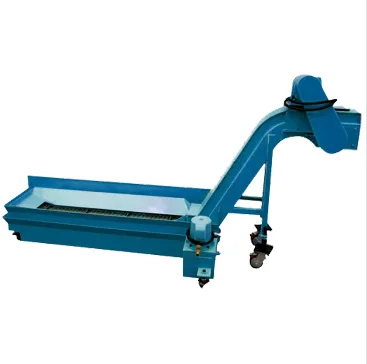Chip Conveyor: Essential Solutions for Efficient Chip Management
In the world of industrial machining and metalworking, managing metal chips and shavings is a crucial part of maintaining operational efficiency. A chip conveyor is an automated system designed to collect, transport, and dispose of these metal fragments during machining operations. Whether you're running a CNC shop, a large-scale manufacturing facility, or a fabrication workshop, installing the right chip conveyor can save time, reduce manual labor, and prolong equipment life.

This article explores everything you need to know about chip conveyors — from their importance and variations to choosing the right chip conveyor manufacturers, available chip conveyor types, and what to consider when looking for a chip conveyor for sale.
What Is a Chip Conveyor?
A chip conveyor is a mechanical system used to remove metal chips, turnings, and other debris from a machining area. These systems are usually integrated with CNC machines, milling machines, lathes, or grinding equipment to automate the chip removal process.
The primary goals of using a chip conveyor are:
Keeping the workspace clean
Improving machine efficiency
Minimizing downtime
Protecting sensitive components from damage
Enhancing operator safety
Whether handling aluminum, steel, brass, or cast iron chips, a reliable chip conveyor ensures uninterrupted production.
Chip Conveyor Types
There are several chip conveyor types, each designed to handle different chip sizes, materials, and volumes. Here are the most common varieties:
1. Hinged Belt Chip Conveyor
This is the most widely used chip conveyor. It uses hinged metal belts with cleats to carry chips and scrap away from the machine.
Best for: Handling medium to large-sized chips
Common in: CNC lathes, machining centers
2. Magnetic Chip Conveyor
Designed specifically for ferrous materials, this system uses magnets beneath a stainless steel belt to pull chips along.
Best for: Fine, dry, or powder-like steel chips
Advantage: Sealed design with no external moving parts
3. Screw or Auger Chip Conveyor
This type features a rotating screw that moves chips through a narrow passage.
Best for: Small chips and limited spaces
Application: Smaller CNC equipment or vertical machining centers
4. Drag Chain Chip Conveyor
It uses a continuous chain with paddles that drag chips along a trough.
Best for: Large volumes of various chip types, including stringy or bushy chips
Application: High-volume, high-duty environments
5. Vacuum or Pneumatic Conveyors
These systems transport chips using air pressure or vacuum power.
Best for: Lightweight materials and fine powders
Application: Cleanroom or high-precision manufacturing
Choosing the right chip conveyor type depends on your material, chip shape and size, and the layout of your workshop or production line.
Choosing Reliable Chip Conveyor Manufacturers
The quality and durability of your chip conveyor largely depend on the chip conveyor manufacturers you choose. A trusted manufacturer offers not only robust systems but also reliable customer support, maintenance services, and customized solutions.
What to Look For:
Customization: Manufacturers who can tailor designs based on your machine's specifications.
Material Quality: Durable construction using stainless steel, hardened belts, and corrosion-resistant components.
Support and Service: Availability of spare parts, installation support, and after-sales service.
Experience: Proven expertise in designing conveyors for various industries (automotive, aerospace, metalworking, etc.)
Global Reach: Manufacturers with a presence in your country or region can reduce shipping times and costs.
Top-tier chip conveyor manufacturers often provide full system integration, including coolant filtration, chip compactors, and tank cleaning.
Chip Conveyor for Sale: Where and What to Look For
If you're in the market for a chip conveyor for sale, there are several places you can look and key considerations to keep in mind.
What to Consider:
Size and fit: The conveyor must integrate seamlessly with your machine.
Chip type: Match the conveyor type to your chip material and size.
Tank capacity: Important if your conveyor is integrated with coolant management.
Ease of maintenance: Choose conveyors with accessible parts and low maintenance requirements.
Budget: Balancing price and durability is key. Overly cheap options may result in higher long-term costs due to breakdowns.
Benefits of Using a Chip Conveyor
Improved Productivity: Automatic chip removal allows machines to run longer without stopping for cleaning.
Cleaner Work Environment: Reduces slip hazards and enhances workplace safety.
Better Machine Health: Prevents chip buildup in machine components, reducing wear and tear.
Coolant Management: Many chip conveyors include coolant filtration systems, improving coolant life and machining quality.
Operator Safety: Automated removal eliminates the need for manual chip handling, reducing injury risk.
Chip Conveyor FAQs
Q1: What chip conveyor type is best for aluminum chips?
A: A hinged belt conveyor is ideal, especially if the chips are medium to large in size. Ensure the conveyor has proper filtering to separate chips from coolant.
Q2: Can I customize a chip conveyor for my machine?
A: Yes. Most reputable chip conveyor manufacturers offer custom solutions based on machine models and operational needs.
Q3: Are used chip conveyors a good option?
A: They can be, provided they’re in good condition. Always inspect for wear, rust, or broken belts before purchasing.
Q4: What is the price range for a chip conveyor?
A: Prices vary by type, size, and features. Basic screw conveyors may start around $1,000, while large-scale magnetic or drag chain conveyors can cost $5,000 or more.
Q5: How often should a chip conveyor be maintained?
A: Regular inspections should be performed weekly. Belts, chains, and filters should be checked for wear and cleaned to prevent blockages.
A chip conveyor is not just an accessory — it’s an essential component of modern machining operations. With the right system in place, you can maintain a clean workspace, reduce machine wear, and boost overall productivity. Whether you’re exploring chip conveyor types for a new installation or browsing a chip conveyor for sale for a retrofit project, make sure to choose high-quality solutions from reputable chip conveyor manufacturers.








